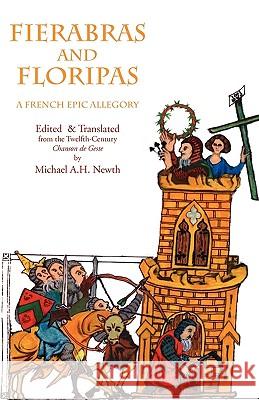Fierabras and Floripas: A French Epic Allegory » książka
Fierabras and Floripas: A French Epic Allegory
ISBN-13: 9781599101576 / Angielski / Miękka / 2010 / 294 str.
"Fierabras and Floripas" relates the tale of two Saracen siblings who join forces with Charlemagne and his Peers. It was the most successful French epic tale - or chanson de geste - among audiences in medieval England, not excluding the great "Song of Roland," with which it shares much of the dynamism of their oral-based genre. Its expansive narrative explores both the limits of epic battle description and the usefulness of allegory to explore moral and spiritual issues. Two separate but successively performed original compositions, "La Destruction de Rome" and "Fierabras" are translated here. Both works belonged to a sub-branch of the "deeds of the king" song-cycle that focused on the legend and significance of the legendary relics of Christ's passion - relics that were exhibited annually at the abbey of St. Denis in Paris, where the poems themselves were probably composed and first performed. At a surface level the tale deals with the historical Saracen attacks on Rome in the ninth century and with Charlemagne's legendary campaigns of retribution across the Continent. As such "Fierabras and Floripas" pulsates with the full flow of epic themes, character types, dramatic and comedic elements, dynamic diction and verbal wit that were the life-blood of the chanson de geste. Newth's translation preserves the dynamic, musical qualities of the original text. His introduction places the tale in its historical context, analyses its allegorical nature and traces the remarkable survival of its key narrative elements in the Western consciousness of its own exceptionalism and superiority to the other. This volume is illustrated with thirteen original drawings from the Hannover, Niedersachsische Landesbibliothek, MS IV-578. A glossary of medieval terms, a select bibliography and generous extracts from the original work and from its literary afterlife are included in this edition. This volume will appeal to both the general and the more specialized reader, in and out of the classroom. 16 illustrations, glossary, bibliography."
"Fierabras and Floripas" relates the tale of two Saracen siblings who join forces with Charlemagne and his Peers. It was the most successful French epic tale - or chanson de geste - among audiences in medieval England, not excluding the great "Song of Roland," with which it shares much of the dynamism of their oral-based genre. Its expansive narrative explores both the limits of epic battle description and the usefulness of allegory to explore moral and spiritual issues.Two separate but successively performed original compositions, "La Destruction de Rome" and "Fierabras" are translated here. Both works belonged to a sub-branch of the "deeds of the king" song-cycle that focused on the legend and significance of the legendary relics of Christs passion - relics that were exhibited annually at the abbey of St. Denis in Paris, where the poems themselves were probably composed and first performed.At a surface level the tale deals with the historical Saracen attacks on Rome in the ninth century and with Charlemagnes legendary campaigns of retribution across the Continent. As such "Fierabras and Floripas" pulsates with the full flow of epic themes, character types, dramatic and comedic elements, dynamic diction and verbal wit that were the life-blood of the chanson de geste.Newths translation preserves the dynamic, musical qualities of the original text. His introduction places the tale in its historical context, analyses its allegorical nature and traces the remarkable survival of its key narrative elements in the Western consciousness of its own exceptionalism and superiority to the other.This volume is illustrated with thirteen original drawings from the Hannover, Niedersächsische Landesbibliothek, MS IV-578. A glossary of medieval terms, a select bibliography and generous extracts from the original work and from its literary afterlife are included in this edition.This volume will appeal to both the general and the more specialized reader, in and out of the classroom.16 illustrations, glossary, bibliography.











